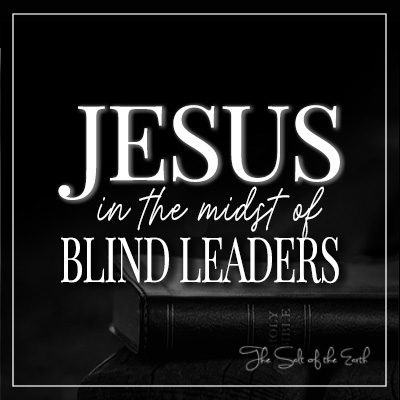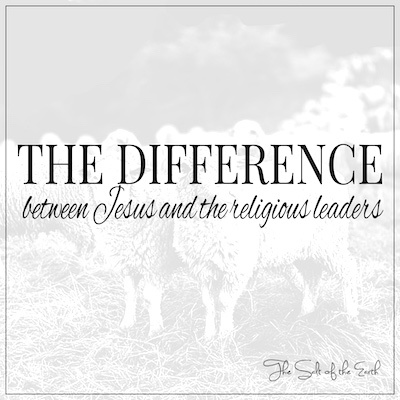The words of Jesus didn’t always bring peace, gëzim, and unity among the people, but often caused murmur, strive and persecution. This also happened in the temple in Capernaum, where Jesus taught and testified about being the Bread of life and that everyone, who would eat His flesh and drink His blood would have eternal life. Instead of believing His words and delighting in His words, His disciples began to murmur and strive among themselves. His disciples couldn’t listen to His words anymore and considered it a hard saying. And because His words offended them, they walked away and left Him. That was not surprising, since they were carnal and Jesus said, that it is the Spirit that quickens, the flesh profits nothing, and that the words, Jesus spoke were Spirit and life (Gjoni 6:26-63). But what did Jesus mean by My words are Spirit and life?
The disciples of Jesus considered His saying hard and couldn’t hear it
These things said He in the synagogue, as He taught in Capernaum. Many therefore of His disciples, when they had heard this, said, This is an hard saying; who can hear it? When Jesus knew in Himself that His disciples murmured at it, He said unto them, Doth this offend you? What and if ye shall see the Son of man ascend up where He was before? It is the Spirit that quickeneth; the flesh profiteth nothing: the words that I speak unto you, they are Spirit, and they are life (Gjoni 6:59-63)
The words of Jesus were not always pleasant for the old man, who is carnal and belongs to the generation of fallen mankind, but they were confrontational, hard, and difficult to listen to, let alone to bear. His words were not always understandable and often gave offense.
But although it was difficult for the old man to hear the words of Jesus and gave offense and often caused a stir, the words of Jesus were the truth and revealed the secrets of the Kingdom of God.
They followed Jesus for the sign and wonders but His words, which derived from the Father and revealed the Kingdom of God and Jesus the Christ, Biri i Perëndisë, they couldn’t bear and ensured that they left Jesus and no longer followed Him.
Since Jesus was sent and appointed by His Father and stood in His service and not in the service of man, Jesus didn’t adjust His words to please His disciples and to win them back.
Jesus even asked His twelve disciples, who were the only ones who were left, if they also wanted to leave.
But Simon Peter answered Jesus, Zot, to Whom shall we go? Thou has the words of eternal life. And we believe and are sure that Thou art that Christ, the Son of the living God (Gjoni 6:68-69).
Jesus spoke the words of His Father
My son, attend to my words; incline thine ear unto my sayings. Let them not depart from thine eyes; keep them in the midst of thine heart. For they are life unto those that find them, and health to all their flesh (Fjalët e urta 4:20-21)
My son, keep my words, and lay up my commandments with thee. Keep my commandments, dhe jetoni; and my law as the apple of thine eye (Fjalët e urta 7:1-2)
The Lord God hath given Me the tongue of the learned, that I should know how to speak a word in season to him that is weary: He wakeneth morning boy morning, He wakeneth Mine ear to hear as the learned. The Lord God hath opened Mine ear, and I was not rebellious, neither turned away back (Isaia 50:4-5)
The words Jesus spoke were the words of His Father. Jesus never spoke from Himself, but He only spoke the words of His Father.
The words of Jesus, which came from the Father, were not always believed and appreciated by the people, but we already read this in the Old Testament.
The words of God, which were spoken through the mouths of the prophets, were not always believed and appreciated by His people, but were rejected.
Many prophets, who were chosen and sent by God and spoke the words of God were persecuted, imprisoned and many times even killed. All because, they spoke the truth of God, which the old man (njeri i rënë) could not bear.
This evil people, which refuse to hear My words, which walk in the imagination of their heart, and walk after other gods, to serve them, and to worship them, shall even be as this girdle, which is good for nothing. For as the girdle cleaveth to the loins of a man, so have I caused to cleave unto Me the whole house of Israel and the whole house of Judah, thotë Zoti; that they might be unto Me for a people, and for a name, and for a praise, and for a glory: but they would not hear (Jeremiah 13:10-11)
I have not sent these prophets, yet they ran: I have not spoken to them, yet they prophesied. But if they had stood in My counsel, and had caused My people to hear My words, then they should have turned them from their evil way, and from the evil of their doings (Jeremiah 23:21-22)
Although God loved His people and wanted the best for His people and His words taught, supported, led, warned, corrected, disciplined, chastised them and provided peace, and made them walk on His way, so that the people were blessed, the people didn’t consider the words of God as good, but as evil, and diametrically opposed the will of the people and therefore they rejected the words God and didn’t return from their evil way and their evil doings, and because of that they brought mischief upon themselves and ended up in horrible circumstances, despite all the warnings of God and His Word (Lexoni gjithashtu: The mischief, people bring upon themselves)
But every time, God’s people called unto God and humbled themselves and repented of her way, God heard the cry of His people and sent His Word, through the mouths of the prophets, and saved and healed His people (Lexoni gjithashtu: What does it mean God sent His Word and healed them?).
The words of God diametrically oppose the words of man
The people, who belong to the generation of fallen man (the old man) and have the devil as their father, are carnal and to them, the words of God diametrically oppose their will and the lusts and desires of their flesh.
The words of God are Spirit and not flesh, therefore the words of God are considered foolish and illogical to them, and therefore they refuse to believe the words of God and submit to God and obey and do the words of God in their lives (Oh. Fjalët e urta 28:5, Gjoni 8:43-44, 1 Korintasve 1:18-25; 2:14).
The old man is carnal and can’t understand the things of God and His Kingdom, because they are spiritual.
Note, spiritual doesn’t mean moving in the supernatural, in the spirit realm. Because as mentioned before, there are a lot of people, who walk in the spiritual realm, like fortunetellers, witches, satanists, shamans, winti priests and practitioners, voodoo priests, and practitioners, etj., and experience supernatural manifestations, and receive supernatural revelations and insights and predict the future, heal and do other signs and wonders, but are not born again but carnal and enter the spirit realm from their flesh and move in the occult.
They are natural people, who use objects, formulas, (meditation) technics, methods, and rituals to enter from their flesh a state of ecstasy and open themselves to demonic powers (evil spirits) who give them insights, visions, and power (energy) to do what they ask for.
Megjithatë, the devil never gives something for free, but always demands something in return. Therefore they will be afflicted and tortured by these demonic powers, who make their lives a living hell (Lexoni gjithashtu: Do you have to be born again to walk in the supernatural?)
Spiritual means, that the spirit of man is raised from the dead by the power of the Holy Spirit and man no longer lives in bondage under the authority of death in darkness (and bears the fruit of death, which is sin), but that the same Spirit of God, who was in Jesus Christ, dwells in the new man, and the new man walks in obedience to the words of God, which are Spirit and life.
Man, who was dead before God has been made alive by the Spirit and lives for God and shall walk after the Spirit, which means to walk in obedience to the Word.
Të gjithë, who is born of water and Spirit shall obey the words of Jesus, which are Spirit and life
Jesus answered and said unto him, Verily, verily, I say unto thee, Except a man be born again, he cannot see the Kingdom of God (Gjoni 3:3)
Jesus answered, Verily, verily, I say unto thee, except a man be born of water and of the Spirit, he cannot enter into the Kingdom of God. That which is born of the flesh is flesh; and that which is born of the Spirit is spirit (Gjoni 3:5-6)
By becoming born again in Christ; the death of the flesh and the resurrection from the spirit from the death and the indwelling of the Holy Spirit, man has become a new creation, who is spiritual and does not only see the Kingdom of God, but has also entered the Kingdom of God.
It is the Spirit that quickens, the flesh profits nothing. The words, Jezusi foli, and still speaks, are Spirit and life.
Because those, who have become a new creation, are spiritual, they shall feed themselves daily with the words of God, which are Spirit and life. The Word is their daily Bread.
Every word of God contains the Spirit and the life of God and feeds the spiritual man, and by submission and obedience to the words of God, the spiritual man shall grow up to spiritual maturity.
Those, who belong to Christ and are born of water and Spirit shall listen to the words of Jesus and obey and do them in their lives.
They know the will of God and discern the spirits and have knowledge of good and evil. The unseen realm will no longer be hidden and foolish to them, but is revealed to them and has become a reality. They will see exactly what kinds of lies and powers they are dealing with and what kind of spirits control the people and keep them in bondage.
The carnal man, who belongs to the world, is blinded in his mind by the darkness and death, but the sons of God (si meshkujt ashtu edhe femrat) see because of the Truth, Light, dhe Jeta.
The words you believe and follow determine the path you walk on
Jesus cried and said, He that believeth on Me, believeth not on Me, but on Him that sent Me. And he that seeth Me seeth Him that sent Me. I am come a light into the world, that whosoever believeth on Me should not abide in darkness. And if any man hear My words, and believe not, I judge him not: for I came not to judge the world, but to save the world. He that rejecteth Me, and receiveth not My words, hath one that judgeth him: the word that I have spoken, the same shall judge him in the last day. For I have not spoken of myself; but the Father which sent Me, He gave me a commandment, what I should say, and what I should speak. And I know that his commandment is life everlasting: whatsoever I speak therefore, even as the Father said unto Me, so I speak (Gjoni 12:44-50)
The path you walk on, depends on the words you listen to, believe, obey and do in your life
The words of the world, which are carnal and death and lead to eternal death, diametrically oppose the words of God, which are Spirit and life and lead to eternal life.
The carnal man shall listen to the words of the world; the words of man, which please the flesh, and shall believe and obey these words, whereby the flesh reigns and the person does the works of the flesh and bear the fruit of death, which is sin.
Megjithatë, the spiritual man, who is quickened (made alive) by the Spirit, shall listen to the words of God, which pleases the spirit, and shall believe and obey them, whereby the Spirit reigns and the person shall do righteous works and bear the fruit of the Spirit.
The words of God are Spirit and life. And obedience to the words of God means enmity with the world and death to the flesh (nga duke e larguar plakun dhe duke veshur njeriun e ri), but the words of God mean peace with God and life to the spirit.
If you obey the words of God, which are Spirit and contain the life of God and give life, you shall walk after the Spirit on the narrow path.
The narrow path is not the easiest path to walk on in life, but it is the only path that leads to eternal life
‘Bëhu kripa e tokës’







